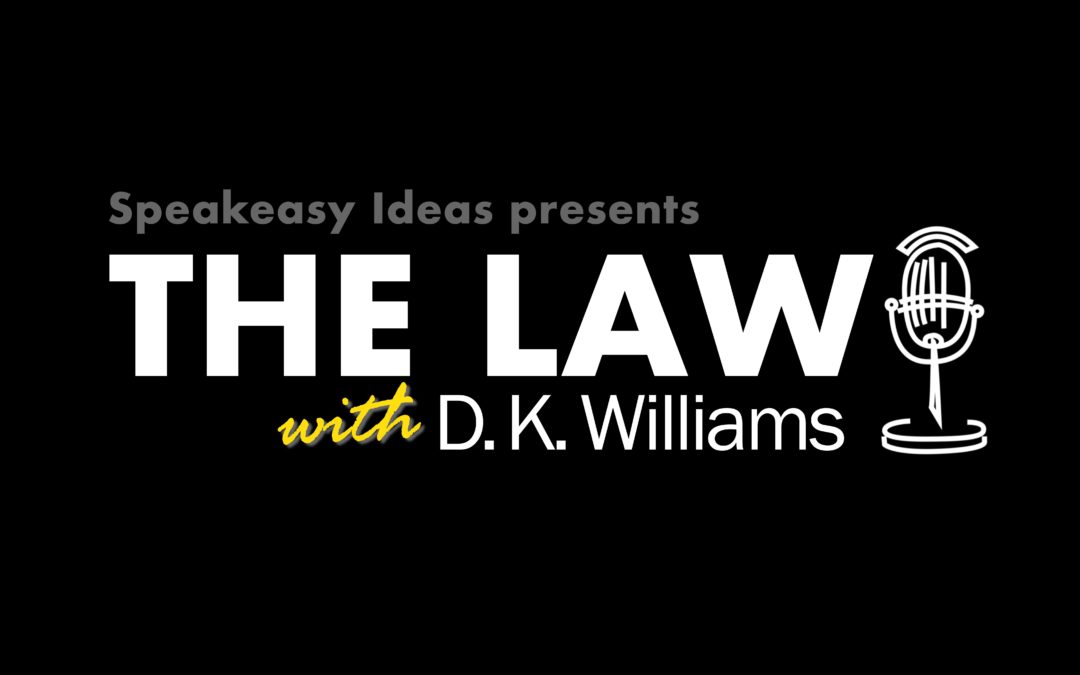
by D.K. Williams | Apr 11, 2020 | The Law with D.K. Williams
Podcast: Play in new window | Download
Subscribe: Apple Podcasts |
I could drink, legally, during my freshman year of college, but not my sophomore year. Then I was legal again my junior year. Why? Because of the National Minimum Drinking Age Act of 1984. What authority does Congress have to set the drinking age for the states? That’s what South Dakota wanted to know. South Dakota said Congress had no such authority. The U.S. Supreme Court, in a 7-2 decision, disagreed. They upheld the act. We discuss it.

by D.K. Williams | Apr 4, 2020 | The Law with D.K. Williams
Podcast: Play in new window | Download
Subscribe: Apple Podcasts |
Pirates! Blackbeard! Queen Anne’s Revenge! Sovereign immunity! Enumerated powers! And, sexiest of all, copyright law! Stare decisis and legislative history, and separation of powers, too. The U.S. Supreme Court, just two weeks ago, dealt with them all. Did I mention PIRATES?! Avast, check it out, matey.

by D.K. Williams | Mar 27, 2020 | The Law with D.K. Williams
Podcast: Play in new window | Download
Subscribe: Apple Podcasts |
During the Civil War, Lambdin Milligan, a citizen of Indiana, was arrested, tried, convicted, and sentenced by a military tribunal to hang for alleged anti-Union activities. He argued his conviction was illegal and sought a writ of Habeas Corpus for his release. A unanimous Supreme Court ruled in Milligan’s favor. This case discussed the suspension of Habeas Corpus, martial law, and the power of government action during “exigencies” like a war (or coronavirus outbreak). A very timely case from the Civil War era.

by D.K. Williams | Mar 19, 2020 | The Law with D.K. Williams
Podcast: Play in new window | Download
Subscribe: Apple Podcasts |
In 1899, in a story that could have been an episode of Gunsmoke or Bonanza, tribal police officer John Bad Elk shot and killed another tribal officer who was attempting to arrest him. Bad Elk was convicted and sentenced to be hanged. The U.S. Supreme Court awarded Bad Elk a new trial based on the common law argument that he had the right to resist an unlawful arrest. Sometimes, even today, this case will be cited for that proposition. However, the common law rule has been changed by statute just about everywhere. Do not do what John Bad Elk did. His argument no longer holds up.

by D.K. Williams | Mar 12, 2020 | The Law with D.K. Williams
Podcast: Play in new window | Download
Subscribe: Apple Podcasts |
In November, 2013, Robert Miller was driving through Wyoming on his way to his home in Illinois. During a traffic stop, a state trooper discovered $470,040 in cash in his car. And took it. Just last week, the Wyoming State Supreme Court ruled unanimously that the State of Wyoming had to return the cash it had taken from Mr. Miller during the stop. Criminal charges were never filed against Mr. Miller, yet the state intended to keep the cash it had confiscated pursuant to the Orwellian Newspeak term “civil asset forfeiture.”

by D.K. Williams | Mar 6, 2020 | The Law with D.K. Williams |
Podcast: Play in new window | Download
Subscribe: Apple Podcasts |
In this 5-4 1989 decision, the U.S. Supreme Court held that burning an American flag was speech the government could not punish pursuant to the First Amendment. Gregory Johnson, a member of the Revolutionary Communist Youth Brigade, participated in an anti-government protest during the 1984 Republican National Convention in Dallas, TX. The protest ended in Mr. Johnson burning an American flag in front of Dallas City Hall. He was arrested and sentenced to one year in jai. The majority of the Court held this conviction was a violation of the First Amendment. The dissent, however, said the flag was such an important symbol, they would make an exception to the Constitution for it.

